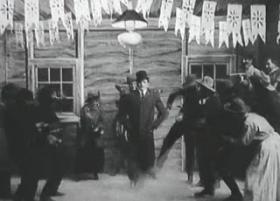Reprinted from KUAR.org. I am hosting a screening of Broncho Billy movies on Jan. 10, 2014, at Arkansas's Old State House Museum.
Gilbert M. "Broncho Billy" Anderson was born Max Aronson
in Little Rock, Ark., in 1880. His family moved to St. Louis when he
was a boy, but Max returned to Arkansas as a young man to work with his
brother-in-law as a cotton buyer in Pine Bluff. Max, however, had caught
the acting bug and soon moved to New York City, where he changed his
name to Gilbert M. Anderson.
Like most young actors in that
day, Anderson sought to hone his craft on the stage. Instead, he found
work with the Edison motion picture company working for director Edwin
S. Porter. One of his first pictures was a one-minute film called "What
Happened in the Tunnel" about a young man flirting with a pretty girl on
a train who gets a surprise when the train goes through a tunnel.
http://www.youtube.com/watch?v=VY5B4FRBl0s
The same year he made a movie that would change his life and change motion picture history. Porter's The Great Train Robbery
(1903) is often credited as the movie that changed the way filmmakers
would put together their movies. Anderson played three different parts
in this movie - a bandit, a tenderfoot, and a man who tries to escape
the robbers but is shot. After finishing the movie and seeing how
audiences reacted to it, Anderson decided the movie business was for
him.
Anderson
did not only want to act in movies, he wanted to write and direct them
as well. Based on what he learned from Porter, Anderson had ideas about
what would make a good movie and how the audience would respond. After a
couple of false starts, he convinced businessman George Spoor to
partner with him and formed the Essanay (S and A) motion picture studio. Essanay
would make hundreds of one-reel westerns and comedies between 1907 and
1918, many of them written by, directed by and starring Anderson.
Early on, Anderson developed a persona for himself in his western films that he called Broncho Billy. The character of Broncho
Billy was often an outlaw who turns good or sometimes just a cowboy
defending the weak. Titles of the films often told the whole story: Broncho Billy and the Escaped Convict, Broncho Billy's Indian Romance, Broncho Billy and the Baby. The character of Broncho Billy became so closely associated with Anderson that for the rest of his life he would be called Broncho
Billy Anderson. He became Hollywood's first western star, ahead of Tom
Mix, William S. Hart and Harry Carey. Anderson received an Honorary
Academy Award in 1958 for his "contributions to the development of
motion pictures as entertainment."
http://www.youtube.com/watch?v=kPUnh3I_n9Y
Friday, January 10, 2014
Subscribe to:
Comments (Atom)


